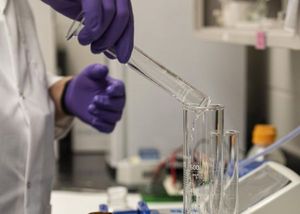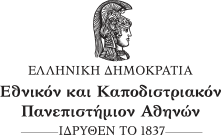POSTGRADUATE STUDIES
Purpose and Actions of the MSc Food Chemistry

The Master's Program (MSc) in FOOD CHEMISTRY aims at the study of food ingredients (additives or natural), the study and use of food ingredients to create foods with enhanced functional properties, the safety control of food (microbiological, toxicological and chemical), the use of technology in the preparation, preservation, distribution, etc. of food and the study of nutritional rules for a balanced diet.
The purpose of the MSc is the provision of specialized knowledge in food science and in particular in food chemistry, knowledge necessary for the graduate for employment in the food industry but also in related public bodies e.g. Unified Food Control Agency (EFET), General Chemical State Laboratory, but also necessary for starting and creating new businesses or for strengthening existing family food businesses. More specifically, the aim is to provide a high level postgraduate education in the scientific field of food science and more specifically education in food chemistry, quality control and food safety, food technology and nutrition.
The food sector is one of the most important at the Greek and international level and has a great appeal for prospective postgraduate students who aim for later professional careers. This is a sector that supports the national economy and in fact there is also the possibility of primary development so that new jobs can be created for young people in order to avoid the movement of Greek scientists abroad, the so-called "brain drain".
There is relevance of this MSc with the subject of the first study cycle of the Chemistry Department of the Greek Academy of Sciences, where the basic knowledge is now enriched with specialized knowledge in matters of chemistry and food science in general, knowledge which is fully supported by the excellent scientific competence of the teachers in the specific subject, who have similar research and published work in peer-reviewed scientific journals and international conferences.
WAY OF TEACHING
- Face-to-face Lectures and Laboratory Exercises
USE OF INFORMATION AND COMMUNICATION TECHNOLOGIES
- Use of I.C.T. (powerpoint) in Teaching
- Communication with students will take place via e-mail.
- Learning process support and posting of educational material through the eclass online platform.
COURSE ORGANIZATION
A total of one hundred and twenty (120) credits (ECTS) are required to obtain a BMI. [The courses of each PMS correspond to a minimum of sixty (60) credits (par. 5, no. 33, law 4485/2017)].
The program of courses per specialization is structured as follows:
First Semester
Food Analysis (lecture, workshops and assignment) (15 ECTS)
Food Microbiology (lecture, laboratories, laboratory examination and assignment) (15 ECTS)
Total 30 ECTS
Second Semester
Food Technology (10 ECTS)
New trends in food chemistry (10 ECTS)
Nutrition (10 ECTS)
Total 30 ECTS
Third Semester
Original Bibliographic Thesis (30 ECTS)
Total 30 ECTS
Fourth Semester
Master's thesis (30 ECTS)
Total 30 ECTS
STUDENT EVALUATION
1. Written final exam (75%) which includes:
- Short answer questions
- Multiple choice questions
2. Written laboratory report for each laboratory exercise (25%)
The student must secure a passable grade (≥5) in 1 and 2.
